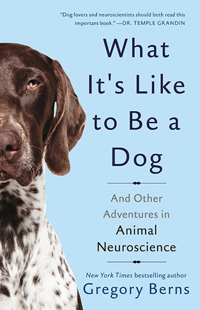In this week’s eSkeptic:
SCIENCE SALON # 22
Dr. Gregory Berns — What It’s Like to Be a Dog…and Other Adventures in Animal Neuroscience
In this wide-ranging dialogue (recorded on September 1, 2017) on the nature of consciousness Dr. Michael Shermer talks with Dr. Gregory Berns, Distinguished Professor of Neuroeconomics and Director of the Center for Neuropolicy and Facility for Education and Research in Neuroscience.
Dr. Berns is famous for his use of fMRI to study canine cognitive function in awake, unrestrained dogs. The goals of his research are to non-invasively map the perceptual and decision systems of the dog’s brain and to predict likelihood of success in service dogs. He also uses diffusion tensor imaging (DTI) to reconstruct the white matter pathways of a wide variety of other mammals, including dolphins, sea lions, coyotes, and the extinct Tasmanian tiger.
Shermer and Berns address the so-called “Hard Problem of Consciousness” of “what is it like to be a bat (or dog)?” What is it like to be another sentient being has been impossible to understand until and unless we can get inside the other conscious creature’s head. Now we can thanks to this new technology. Of course, we cannot have a first-person subjective experience of being a dog—and in this sense the “Hard Problem of Consciousness” is something of a conceptual error inasmuch as it can never be answered in this first-person subjective sense, but we can come close to understanding what dogs (and other conscious creatures) are thinking and feeling.
Order What It’s Like to Be a Dog from Amazon.
If you enjoy the video, audio, and written content we produce, please show your support by making a donation. Your ongoing patronage is vital to our organization’s mission.

Headlines about recent scientific studies are notoriously unreliable. In this week’s eSkeptic, Harriet Hall, M.D. (aka the SkepDoc) examines a study that caused alarming headlines last year about the dangers of drinking diet soda. This column appeared in Skeptic 22.4 (2017).
Diet Sodas
Are the Dangers in the Chemicals or the Headlines?
In April 2017, there was a flurry of news reports with alarming headlines:
- “Diet Sodas May Raise Risk of Dementia and Stroke, Study Finds”
- “A Daily Diet Soda Habit May Be Linked to Dementia–Alzheimer’s”
- “Is Diet Soda Harming Your Brain Health?”
- “Diet Sodas Tied to Dementia and Stroke”
- “Here’s Another Reason You Might Want to Quit Diet Soda”
- “Drinking Too Much Soda May Be Linked to Alzheimer’s”
- “Is Soda Bad For Your Brain? (And is Diet Soda Worse?)”
- “Diet Soft Drinks Triple the Risk of Dementia”
- “Two Things Diet Soda Does to Your Brain”
Some of these headlines were from respectable sources like The New York Times and The Washington Post. It’s not surprising that many people were alarmed by the news and assumed that diet sodas had been proven to cause dementia. Some people were frightened enough to stop drinking diet sodas.
Headlines are designed to get people’s attention so they will read the article. They are notoriously unreliable. The first thing is to check whether the information in the body of the articles matches the headlines; sometimes it doesn’t. Even when the information matches, the article may selectively report some but not all of the studies’ findings, and it may put an unwarranted spin on the meaning of the findings. These headlines all referred to a single study; I wanted to know what that study actually reported, so I read it.
What Did the Study Show?
The study, by Matthew Pase and his colleagues, was published in a reputable journal, Stroke. The subjects were 2,888 individuals in the community-based Framingham Heart Study Offspring cohort. During a 10-year period of observation, 97 subjects over the age of 45 had a stroke: 82 ischemic (restriction of blood flow) as opposed to hemorrhagic (ruptured vessel and bleeding), and 81 subjects over the age of 60 developed dementia (63 consistent with Alzheimer’s). They estimated cumulative consumption of artificially-sweetened soft drinks based on self-reports on a food-frequency questionnaire. They found that drinking one or more artificially-sweetened soft drinks a day was associated with a nearly 3-fold increase in the incidence of ischemic stroke, all-cause dementia, and Alzheimer’s disease compared to drinking none. Sugar-sweetened soft drinks were not associated with stroke or dementia. […]

Image copyright Mathew M. Duman
MONSTERTALK EPISODE 153
Spouting off about Gargoyles
We’re getting our minds in the gutter this week but hopefully won’t leave you drained as we climb into the nooks and crevices of Yale University’s gargoyles and grotesques with photographer and author Mathew Duman, author of An Education in the Grotesque: The Gargoyles of Yale University.
Get the MonsterTalk Podcast App and enjoy the science show about monsters on your handheld devices! Available for iOS, Android, and Windows. Subscribe to MonsterTalk for free on iTunes.













